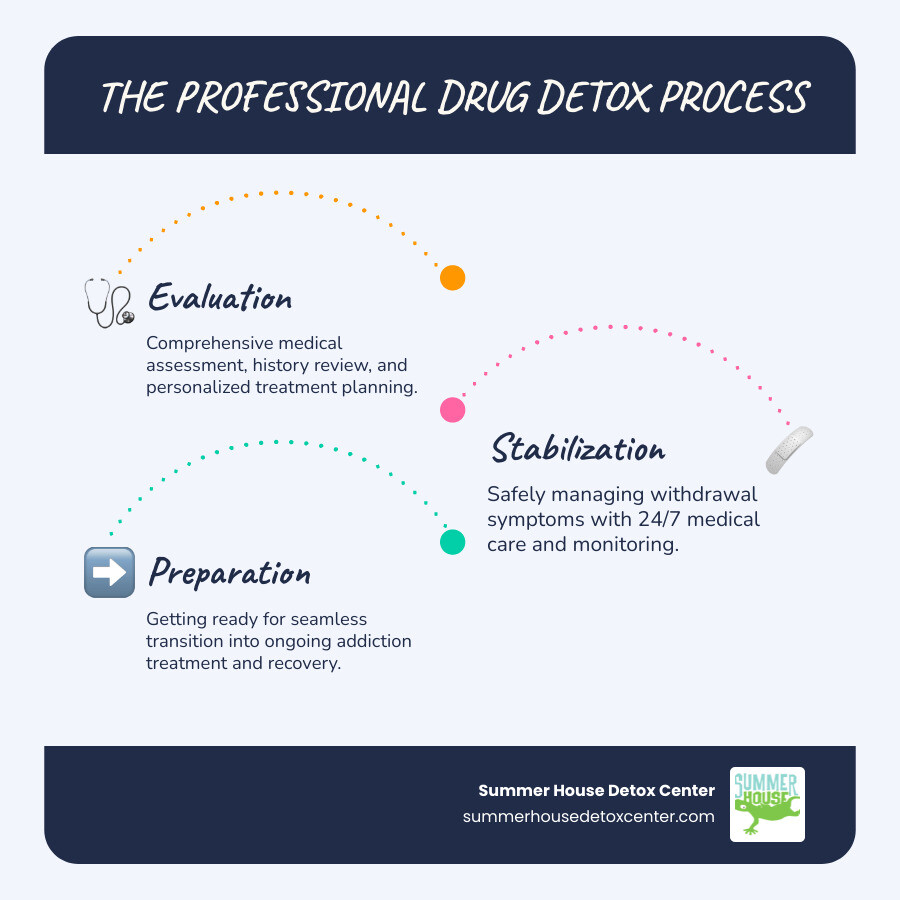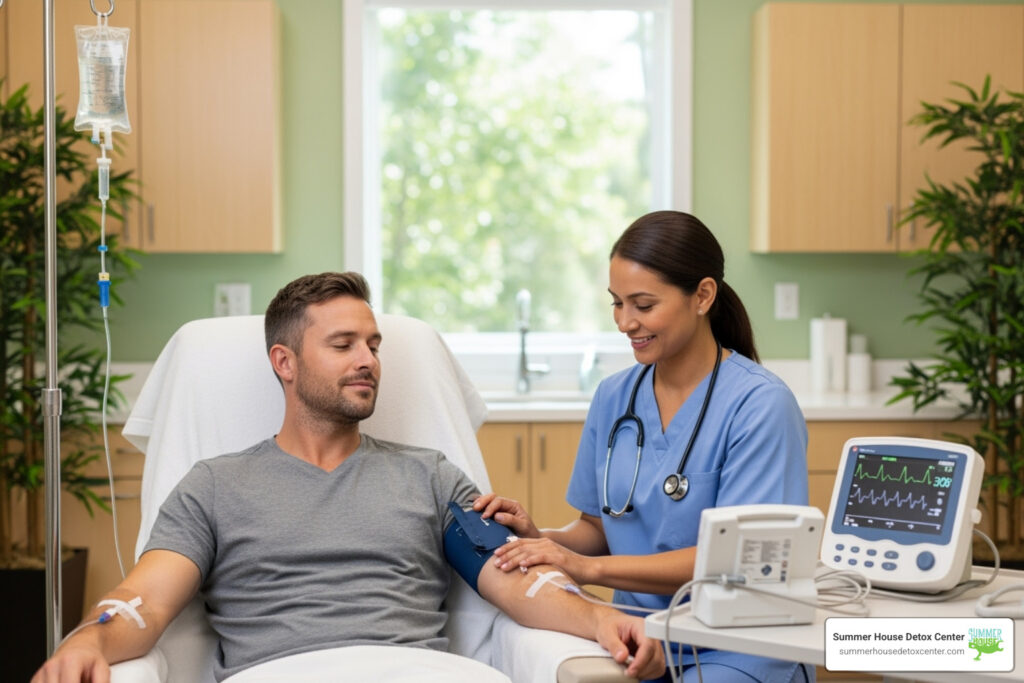What is Drug Detox and Why is it Essential for Recovery?
Drug detox is the medically supervised process of safely removing toxic substances from your body while managing withdrawal symptoms. It’s the essential first phase of addiction recovery, aiming to safely manage acute intoxication and withdrawal. When your body develops a physical dependence on a substance, it adapts to its constant presence. Stopping suddenly can trigger a range of painful and sometimes dangerous withdrawal symptoms, which is why professional help is crucial.
Key Components of Drug Detox:
- Evaluation – Medical assessment and personalized treatment planning
- Stabilization – Managing withdrawal symptoms with 24/7 medical care
- Preparation – Getting ready for ongoing addiction treatment
Why Professional Detox Matters:
- Prevents dangerous complications like seizures or delirium tremens
- Manages painful withdrawal symptoms with appropriate medications
- Provides 24/7 medical monitoring for safety
- Creates a foundation for long-term recovery success
If you’re struggling with drug addiction in Miami or anywhere in Florida, you’re not alone. The fear of withdrawal keeps many people trapped, but detox doesn’t have to be a nightmare. Many in South Florida have tried to quit on their own, only to relapse when symptoms become unbearable. Medically supervised detox exists to bridge the gap between active addiction and recovery, providing a safe space for your body to heal.

Learn more about drug detox:
While detox primarily addresses physical dependence, it also lays the groundwork for tackling the psychological aspects of addiction. Breaking the physical cycle allows you to gain clarity for the therapeutic work needed for lasting sobriety. Long-term substance abuse leads to serious health complications, and detox is a critical intervention to halt this damage and begin the body’s healing journey. You can learn more about the science behind detox and how it facilitates this vital process.
Navigating Withdrawal: Common Symptoms and Side Effects
Withdrawal symptoms are your body’s reaction to the absence of a substance it depends on. The intensity and duration of symptoms vary based on the drug type, length of use, and individual health.
Common physical symptoms include:
- Nausea and vomiting
- Headaches
- Excessive sweating
- Tremors or shaking
- Muscle aches and pains
- Flu-like symptoms (chills, body aches)
- Increased heart rate and blood pressure
Psychological symptoms can be just as challenging:
- Intense cravings for the drug
- Anxiety and panic attacks
- Irritability and agitation
- Depression
- Insomnia or other sleep disturbances
- Mood swings
- Restlessness
- In severe cases, hallucinations or seizures can occur, particularly with alcohol or benzodiazepine withdrawal.
Managing these symptoms safely is paramount. Our medical team at Summer House Detox Center provides 24/7 care to make withdrawal a manageable step toward a healthier future. For more detailed information on withdrawal symptoms and how we help, explore our resources on managing withdrawal symptoms.
How the Detox Process Differs for Various Drugs
The detox process is not one-size-fits-all; it varies significantly depending on the substance. Different drugs have unique withdrawal profiles that require custom medical approaches.
-
Opiates (Heroin, Fentanyl, Prescription Painkillers): Opioid withdrawal feels like a severe flu with intense muscle aches, nausea, and extreme cravings. While rarely life-threatening, it is incredibly uncomfortable, making relapse common without medical help. Medication-assisted treatment (MAT) is crucial for managing symptoms. Learn more about opiate withdrawal symptoms.
-
Benzodiazepines (Xanax, Valium, Klonopin): Detoxing from benzodiazepines without medical supervision can be fatal. Abruptly stopping can cause seizures, psychosis, and severe anxiety. A slow, medically supervised taper is necessary for safety. For more on this critical process, see our page on benzo withdrawal.
-
Alcohol: Alcohol withdrawal is also highly dangerous and requires medical supervision. Symptoms range from tremors to life-threatening conditions like delirium tremens (DTs) and seizures, which can begin within 12 hours of the last drink. 24/7 monitoring is essential.
-
Stimulants (Cocaine, Methamphetamine, Adderall): Stimulant withdrawal is primarily psychological, involving severe depression, intense cravings, and fatigue. The risk of suicidal ideation is a serious concern, so medical support is focused on managing these symptoms in a safe environment.
-
Substance-specific timelines: Detox duration varies. Alcohol detox may last 3-14 days, while opioid detox is often 5-14 days. Benzodiazepine withdrawal can take weeks or months of tapering. Our team understands these nuances and creates a precise plan for each person.
The Professional Drug Detox Process: From Evaluation to Stabilization

Choosing a professional drug detox center is the beginning of hope. Opting for medically supervised detox in Miami gives you the safest possible start to recovery. Professional detox is crucial because safety comes first; withdrawal can be life-threatening without proper supervision. Comfort also matters, and our medical team provides 24/7 care with medications and support to ease your symptoms.
At Summer House Detox Center, we know every person has a unique story. That’s why medical detox is a vital first step—it allows us to create personalized care that addresses your specific needs.
Step 1: Comprehensive Evaluation
Your detox journey begins with a comprehensive evaluation. During this initial assessment, our caring professionals will discuss your medical and substance use history. This confidential conversation is not about judgment; it’s about gathering the information needed to keep you safe and predict what to expect during withdrawal. We’ll review your health conditions, medications, and the specifics of your substance use.
We also screen for co-occurring disorders like anxiety or depression, as these often fuel addiction. Treating both simultaneously offers the best chance for lasting recovery. Learn more about our approach to dual diagnosis rehab.
Based on this assessment, we create a personalized treatment plan—a roadmap designed specifically for your detox experience.
Step 2: Medical and Therapeutic Stabilization
Stabilization is the phase where we help your body safely adjust to functioning without substances. With 24/7 medical supervision, our team can respond immediately to any issues, adjusting your treatment as needed. We use proven medications for symptom management to reduce cravings and prevent dangerous complications like seizures.
Beyond medication, we monitor vital signs and provide emotional support. We also begin addressing the mental aspects of addiction, as the role of therapy in detox is to plant seeds of hope for your recovery journey.
Proper nutritional support and hydration are also key. Addiction often leads to malnourishment, so we provide balanced meals and ensure you get enough fluids to help your body heal. The role of nutrition in detox is crucial for rebalancing brain chemistry. When you’re ready, gentle movement like walking can also boost your mood, highlighting the importance of exercise in healing.
Step 3: Preparing for the Next Stage of Treatment
As withdrawal symptoms ease, we help you prepare for the future. Detox is the beginning of recovery, and this phase sets you up for long-term success.
We focus on fostering entry into treatment by discussing continuing care options and helping you choose the right path. Education on addiction is also key; understanding it as a medical condition is freeing and highlights the importance of ongoing treatment. We also introduce relapse prevention basics, like recognizing triggers and building a support network.
Planning for life after detox involves practical steps. The transition to rehab or other care is made smooth through careful preparation. Our goal is to see you succeed in long-term recovery, which is why we put so much effort into preparing you for what comes next.
Choosing Your Path: Types of Detox Programs and Key Considerations

When you’re ready for recovery, understanding your drug detox options in Miami and throughout Florida is crucial. Not all programs are created equal.
At Summer House Detox Center, we specialize in inpatient medical detox. You’ll stay with us 24/7, supported by medical professionals, many of whom are in recovery themselves. Our approach integrates holistic strategies with evidence-based care, creating a healing environment. You’ll have access to our comprehensive detox services in a retreat-like setting.
Choosing a local South Florida center means your family can visit easily, and you can connect with the local recovery community, which is a comfort when starting your journey.
Medical Detox vs. Unsupervised Detox: A Safety Comparison
Many wonder, “Can’t I just detox at home?” While it’s a natural question, it’s crucial to understand the risks.
Medical detox provides what unsupervised detox cannot: safety, 24/7 medical care, access to medications, and a much higher success rate. Our medical professionals monitor you around the clock, ready to manage any complications immediately.
In contrast, unsupervised detox at home carries life-threatening risks. Dangerous withdrawal complications like seizures or delirium tremens can be fatal without medical support. The lack of medical support also leads to an extremely high risk of relapse, as unbearable symptoms often drive people back to substance use.
Attempting to quit “cold turkey” is not brave; it’s dangerous. The importance of medically supervised detox cannot be overstated, especially for alcohol, benzodiazepines, or opioids.
Medications Commonly Used in a Professional Drug Detox
A major advantage of professional drug detox is access to medications that reduce discomfort and ensure safety. These are often essential for a successful detox.
- Buprenorphine (Suboxone): This is a game-changer for opioid withdrawal. Does Suboxone help with opiate withdrawal symptoms? Yes, it makes the experience manageable.
- Methadone: Another effective, FDA-approved medication for opioid dependence that requires careful monitoring. Our team determines Which medications are used in opiate detox? based on your needs.
- Benzodiazepines (Librium, Valium): Essential for alcohol detox to prevent seizures and reduce anxiety.
- Anticonvulsants: Provide additional seizure protection and can help reduce cravings.
All medications are FDA-approved and carefully monitored by our medical team for safety and effectiveness, following the latest medical best practices.
Special Considerations: Pregnancy, Rapid Detox, and Insurance
Certain situations require extra care during drug detox. Whatever your circumstances, we are here to help you safely.
- Detox during pregnancy: This requires immediate medical attention, as untreated withdrawal poses severe risks to the baby. We work with obstetricians to ensure the safest care for both mother and child. For opioid dependence, medications are often essential. Learn more about Methadone and pregnancy.
- Rapid Detox: Procedures promising a quick fix under anesthesia are extremely dangerous. Is rapid detox the best way? The answer is no. Risks include heart attack, infection, and death, with a low rate of long-term recovery for survivors.
- Insurance Coverage: Most insurance plans cover detox services. We work with a wide range of plans in Florida and understand state-funded programs. Our admissions team can quickly verify your benefits. To find out Am I covered?, just give us a call for a confidential, no-obligation conversation. Your life is worth the investment.
Life After Detox: Your Next Steps Toward Lasting Sobriety in Florida

Completing drug detox is a huge achievement, but it’s just the beginning of your recovery. Think of detox as clearing the fog so you can see the path ahead. Here in Florida, you have incredible opportunities to continue building your new life.
However, it’s important to be honest: Detox alone isn’t enough for lasting recovery. Your body is free from substances, but the underlying issues that led to addiction still need to be addressed. This is why rehab is key to breaking free permanently. Recovery is a continuum of care, and you’ve already proven you have the strength to walk the path.
Transitioning to Further Addiction Treatment
After detox, intensive treatment helps address the “why” behind addiction. South Florida offers excellent options for your journey.
- Inpatient rehab is often the next step, offering the most intensive care. You’ll live at a facility for 30-90 days, immersed in recovery with individual and group therapy to learn practical skills.
- Partial Hospitalization (PHP) and Intensive Outpatient (IOP) programs offer flexibility. PHP involves several hours of daily treatment while living at home or in sober living. IOP is less time-intensive but still provides structured therapy.
- Sober living homes bridge the gap to independent living, providing a structured, supportive community of peers in recovery.
The core of any good program is therapy and counseling. Individual, group, and family therapy help you develop coping strategies, find community, and heal relationships. Many drug rehab centers in South Florida provide these comprehensive approaches.
How to Find a Reputable Drug Detox Center in Miami
Knowing how to identify a quality drug detox center in Miami is crucial. Look for these key indicators:
- Accreditation and Licensing: The center should be state-licensed and accredited by The Joint Commission (JCAHO) or CARF, which signifies high standards for safety and care.
- Staff Qualifications: Ensure care is overseen by licensed medical doctors, nurses, and certified addiction counselors. At Summer House, we’re proud that some staff are in recovery, offering both professional expertise and lived experience.
- Evidence-Based Practices: The center must use scientifically proven treatments, including appropriate medications and therapies. Avoid those promising miracle cures.
- Individualized Treatment: Quality centers create personalized plans based on your unique history and needs, not a cookie-cutter approach.
- Continuum of Care: The best centers help you transition smoothly to the next level of treatment, with clear pathways for ongoing care.
SAMHSA offers a resource for Finding a treatment center. At Summer House, our approach to drug and alcohol detox in Miami, FL provides this level of personalized, medically supervised care, emphasizing comfort, dignity, and hope.
Building a Foundation for Long-Term Sobriety
Real recovery happens after treatment, and your aftercare plan is your lifeline. Building a strong foundation involves several key elements:
- Aftercare Programs: These are essential for maintaining sobriety and include ongoing therapy, alumni groups, and check-ins. Aftercare drug rehab provides support for lifelong recovery.
- Support Groups: Groups like AA and NA offer a free, accessible community of peers who understand your journey. You can find local AA meetings throughout South Florida.
- Family Therapy: Addiction affects the whole family. Therapy helps repair relationships, improve communication, and teach your family how to support you.
- Healthy Coping Mechanisms: Learning to manage stress and triggers without substances is vital. This involves building a toolkit of healthy strategies that work for you.
Beginning recovery takes courage. At Summer House Detox Center, we provide a compassionate, medically-supervised environment for that crucial first step. We know recovery is a marathon, not a sprint, but it gets better and is absolutely worth it. As you begin rebuilding your life after rehab, every sober day is a victory. Learn more about building a strong foundation in life after detox.
